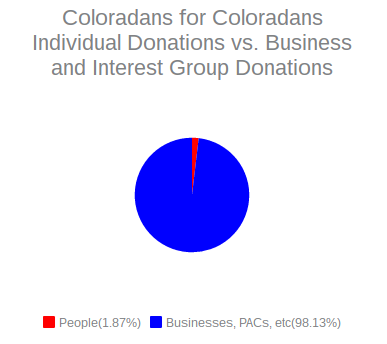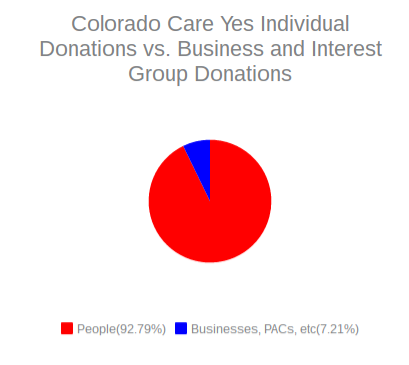Following the Money Part 2: Colorado Care (Amendment 69)
- At October 17, 2016
- By MarkMehringer
- In Research
 4
4
One of the most controversial ballot measures Coloradans will be voting on this November is Amendment 69, also known as Colorado Care. In short, Colorado Care would establish a statewide system to provide healthcare for all Colorado residents. My goal is to give you an unbiased look at how the proponents (a committee called Colorado Care Yes) and opponents (a committee creatively titled Coloradans for Coloradans) of this ballot measure are funding their respective efforts.
A quick personal note before we jump into the numbers- I cannot help but notice the irony of writing about healthcare today. I’m at a hospital sitting by my father’s side as he fights for his life against an aggressive form of cancer. I’ve been following the debate over Colorado Care for around a year now, and it is a debate that I’m glad we’re having. Regardless of how you feel about this particular amendment, I hope we can all agree that our healthcare system is broken. It costs far too much and it falls short for far too many people. It certainly fell short for my dad. Personally I’m open to a wide array of potential solutions, as long as we are debating our options in good faith and earnestly working on changing this system for the better. People’s lives depend on it.
Colorado Care Yes has raised around $782,000 to support this ballot measure. Coloradans for Coloradans has raised just over $4,000,000 to defeat the measure. How has the opposition managed to raise 5 times as much as the folks behind Colorado Care? Let’s compare the contributions received from individuals with contributions from non-individuals (corporations, PACs, etc.) for both of these committees. First we’ll examine that $4 million raised by Coloradans for Coloradans:

Over 98% of that $4 million comes from non-individuals; this money is from corporations, PACs, and various other interest groups, which we will breakdown further. Now, let’s look at this same metric for the Colorado Care Yes committee.
 It’s interesting that these pie charts are almost perfect mirror images of each other. From this single metric, we can plainly see that the opposition to Colorado Care is funded almost exclusively by corporations and interest groups, and the pro-Colorado Care folks are funded almost exclusively by individuals. Already we can make some sense of the fundraising disparity.
It’s interesting that these pie charts are almost perfect mirror images of each other. From this single metric, we can plainly see that the opposition to Colorado Care is funded almost exclusively by corporations and interest groups, and the pro-Colorado Care folks are funded almost exclusively by individuals. Already we can make some sense of the fundraising disparity.
Before we break down these contributions to try to determine the motives of the donors behind these committees, let’s do some averaging:
The Colorado Care Yes committee has received over 4,000 separate donations with an average size of around $160. The Coloradans for Coloradans committee has received under 400 separate contributions with an average donation of around $10,000.
Next I want to further analyze the non-individual donations for the Coloradans for Coloradans committee and maybe we can shed some light on their motives. Here’s a list of the top ten donors:
| Contributor | Contributor Type | Amount |
| ANTHEM, INC. | Business | $1,000,000.00 |
| KP FINANCIAL SVCS OPS | Business | $500,000.00 |
| UNITED HEALTHCARE SERVICES, INC. | Business | $450,000.00 |
| CENTURA HEALTH | Business | $250,000.00 |
| HEALTHONE SYSTEM SUPPORT | Business | $200,000.00 |
| SCL HEALTH | Business | $100,000.00 |
| PHRMA | Business | $100,000.00 |
| MOUNTAIN WESt LOCKTON COMPANIES, | LLC | $100,000.00 |
| DAVITA | Business | $75,000.00 |
| CIGNA HEALTH AND LIFE INSURANCE COMPANY | Business | $60,000.00 |
This is the smoking gun. First, we could see that the opposition to Colorado Care has raised a large amount of money, then we could see that the money is coming almost exclusively from a small number corporations and interest groups, and finally we can see that they are large insurance companies who stand to lose money if Colorado Care passes. The insurance company Anthem is alone responsible for a whopping 25% of this committee’s funds. Anthem is based in Indiana and reported an annual profit of $2.5 billion last year on $79 billion in revenue. Now let’s look at the top 10 biggest contributors to the Colorado Care Yes committee:
| Contributor | Contributor Type | Amount |
| LYN GULLETTE | Individual | $118,000.00 |
| IVAN MILLER | Individual | $108,000.00 |
| ELIZA CARNEY | Individual | $43,000.00 |
| CO-OPERATE COLORADO | Other | $39,000.00 |
| DAVID BECKWITH | Individual | $33,000.00 |
| RALPH OGDEN | Individual | $32,000.00 |
| JUDITH BURKE | Individual | $25,000.00 |
| THOMAS BOST | Individual | $10,000.00 |
| KATHERINE KOHNEN | Individual | $10,000.00 |
| MARK MATTHEWS | Individual | $5,100.00 |
Based on this data, I believe it’s fair to say that Colorado Care Yes is financed primarily by thousands of people in Colorado sending in modest amounts, with a handful of generous contributions that were likely necessary to get the 95,000 signatures needed to put the amendment on the ballot. Colorado Care, and healthcare in general, is a complicated issue that deserves a vigorous and informed debate. While it takes money for both sides to participate in that debate, corporations spend orders of magnitude more than groups of people could ever hope to raise. This often prevents an even, rational debate from taking place.
Whether you support or oppose this measure, I hope we can all see the danger here. By allowing companies to spend unlimited amounts of money on and against these ballot measures, we’ve given them de facto veto power over any legislation they perceive to be a threat to their revenue stream. Even if you agree with them this time around, the larger problem is corporations and interest groups manipulating the political process to protect or grow their bottom line.
This is the second article in a series we’re calling “Following the Money” where we investigate the funding sources in support or opposition of ballot measures. If you want to stay up to date please get in our contact list here. For the source of these numbers visit the Colorado Secretary of State’s website here.
Jon Biggerstaff
Clean Slate Now, Executive Director
jon@cleanslatenow.org
